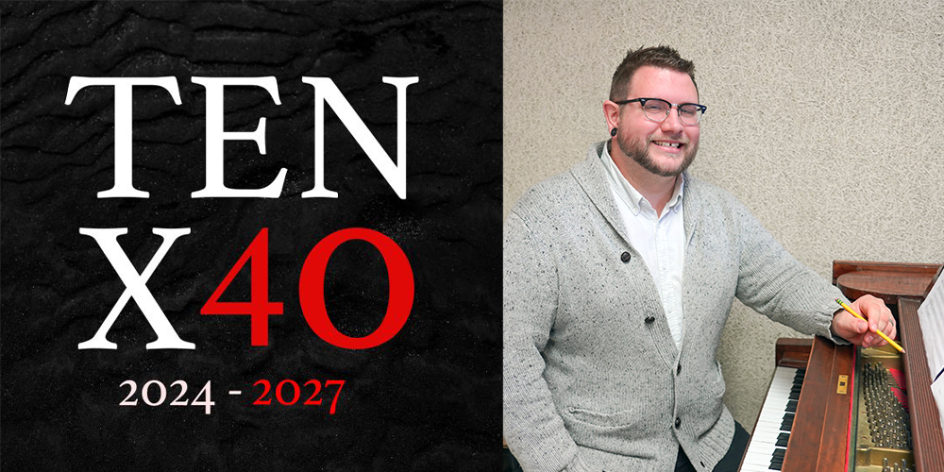
Assistant Professor of Composition and Theory Dr. Matthew Kennedy has undertaken a unique project: leaving his legacy and breaking a curse.
The Curse of the Ninth is a well-documented superstition in the world of music and symphony-writing. Greats like Ludwig van Beethoven, Franz Schubert and Anton Bruckner died before or during the composition of their 10th symphonies, leading to the story furthered by composer Gustav Mahler that the ninth symphony will be a musician’s last.
Matthew is setting out to defeat this superstition, and in doing so, create what will be his symphonic legacy, before his 40th birthday in 2027.
In 2015, Matthew wrote his Symphony No. 1: Innocence (in a Sense) in which he confronts the philosophical question, “How do I reconcile bringing life into this world and dealing with innocence in the age of anxiety?” A symphony, unlike other types of songs or music, is a fixed form for large ensembles. A symphony must have several movements, usually four and traditionally beginning with a significant sonata movement and ending with an exciting finale. For Matthew and musicians of all kinds, their compositions are deeply personal calls to action for the world, or actualizations of the lessons and questions that their individual experiences have brought them. Matthew’s first symphony’s four movements serve to try to answer his philosophical questions about parenthood. “I’ve always used music to help me work through these big ideas of life, and say what I want to say about these serious things.”
He sat on the idea of composing 10 symphonies by 40 years of age for 6 months before announcing it. “I’ve had some health scares in the past few years,” he explained, “and genetics aren’t on my side. Men in my family haven’t been living past 60. So I’ve been really thinking about what I want to do and say with my life and my work.” Additionally, the age of 40 is personally significant to Matthew as he inches closer to it. “How do you make your legacy and say what you want to say for yourself?” he pondered.
Using music and engaging in his passions is the truest answer for the composer. So, he made and shared his plan to reach his goal.
In this year, 2024, he’ll be completing symphonies 2 through 4. In 2025, symphonies 5 through 7 are slated; 8 and 9 are on the docket for 2026. In 2027, the year he turns 40, Matthew will be completing symphony number 10, reaching his lofty goal of sharing his truest self through music (and beating the superstition in the process).
Symphony number 2 is already well underway. “It’s about 75% done,” Matthew shared. “It’s about this idea of the world of academia and the allegory of Macbeth.” Matthew began his journey into academia in 2006 when he started earning his Bachelor of Arts in Music from Anderson University. He was a first-generation college student, then, and would continue on to earn his Master of Music degree from Butler University, and his Doctor of Musical Arts degree from The Hartt School.
“Academia was a different land for me then, but now it’s life,” he furthered. “The symphony conveys my experience in academia from beginning as an adjunct professor, a visiting professor, and now a non-tenure track professor at Heidelberg; all of which had incremental increases in permanence but lacked long-term ability to put down roots.”
He explained, “From what I have observed in this process is something akin to the Shakespearian story of Macbeth, fighting for a foreseen destiny and dealing with ideas of morality, paranoia, power struggle, ambition, and fear.” He’s excited to share these thoughts and meditations with the world, leaving his legacy once and for all.
Good luck to Matthew Kennedy as he brings these big ideas into conversation through music and his symphonies. We’re looking forward to celebrating the big 4-0 with you soon!